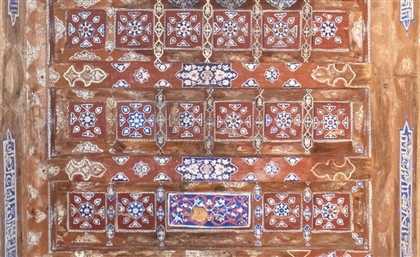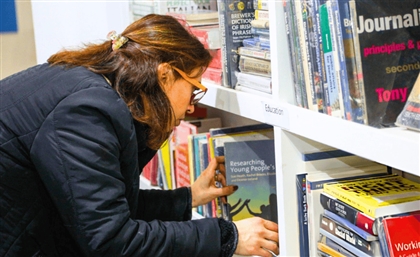Wegz Rewrites The Rules of Egyptian Rap on ‘Aqareb’
The Egyptian rap superstar is past the stage of cementing his status; instead, he’s pursuing a more personal endeavour, unconcerned with how anyone else feels about it.

For years, Wegz has been Egypt’s most unpredictable rap superstar, a figure whose every move sparks conversation across the cultural landscape. His flirtation with mainstream pop has drawn both praise and critique, with some questioning how far he strayed from the generational trap sound he helped define. But where most rappers would double down on trap or hip-hop conventions these days, Wegz instead stretches into dance-driven and globally influenced territory, weaving in Afrobeat, amapiano, and electronic pop textures rarely associated with Egyptian rap.
With Aqareb, his long-awaited debut album, Wegz flips that scrutiny on its head. He doubles down on his lyrical direction from ‘Gadwal El Darb’. Yet, here, he’s past the stage of proving himself or cementing his status; instead, he’s pursuing a more personal, almost introspective endeavour, one that aligns with his artistic instincts rather than external expectations.
And though ‘Khesert El Shaab’ feels rather fitting to be the opening track for the record. It sets the intention and tonality, as he openly dismisses the pressure to make crowd-pleasing hits, declaring that he’ll straddle the glamour of global fame on his own terms, unconcerned with how anyone else feels about it.
The title itself, Aqareb, pivots on a pun, as the word can be translated as both ‘scorpions’ and ‘clock hands’ in English. It reflects the duality Wegz leans into in structuring the record like a 12-hour cycle, simultaneously delivering a pointed response to critics and a personal chronicle of fame’s highs, lows, and sacrifices.
Although Wegz’s flow is more melodic, his delivery retains a sharp, commanding, scorpion-like sting that cuts through the album’s breezy, upbeat production. The record reflects two years of ambition, restlessness, pride, and the nocturnal melancholy of rising to the peak of fame at a young age.
Musically, the album is undoubtedly Wegz’s most diverse and eclectic body of work yet, and what makes it stand out from his other releases is the hyperfocus on the production, packaging it into a more accessible sound.
Although the heavily polished production, mainly helmed by British-Romanian record producer Tudor Munroe, stretches towards global electronic dance music, it doesn’t entirely lose Wegz’s core sonic identity. Across the twelve tracks, he stitches his trap soul into a patchwork of dance-oriented sounds, with influences from Afrobeat, amapiano, alt R&B, hip-hop and funk. Overall, it’s overtly dancey, packed with thrilling grooves and undeniably catchy melodies that would instantly remain on a loop in your head after the first listen.
The record features various guest contributors showcasing Wegz' ambitions to go beyond regional ceilings, such as Nigerian star Seyi Vibez on ‘Mama Afrikya, and French-Cameroonian R&B sensation Tayc on ‘Girlfriend’. Algerian rap veteran Savage Plug reunites with Wegz on ‘De’, where they both meditate on the sacrifice tied to ambition. The track’s production, helmed by Hussien Gamal, feels like a cinematic score imbued with melodic and atmospheric textures and subtle percussion and tight hi-hats. However, around minute two, a dramatic buildup is carried by a grandiose synthwork as Wegz reaches the denouement of his narrative: he is self-made, never opportunistic, and uninterested in validation from those beneath his vision.
Arguably, one of the standouts on the record is ‘Bad Days’, featuring a contribution from prolific Egyptian producer Zuli. The track is a spellbinding fusion that ditches the afro/amapiano sounds that have been dominating the album, pivoting more towards club-focused beat, featuring radical shifts, bombastic drum patterns, and forceful breakbeats, underlined with punchy drum kicks, bass riffs and trippy synthpop keys. The mixing is on-point, courtesy of Mokhtar El Sayeh, Somaya Hasaballa and Karem ElNaieb, adding another dimension to the production’s structure.
The orchestral, perhaps theatrical, sonic elements appear in ‘Capsula’, a melancholic interlude led by mellow keys and violin strings. The introspective tonality continues on ‘Ghareeba’, however, contrasting with the track’s overall dance vibe. The track, a collaboration with Ziad Zaza, is the album’s lone Egyptian feature, grounding Aqareb in the scene that birthed him.
Meanwhile, ‘Ezay Tfotny’ dabbles in retro discotheque influences, featuring Marianne Layousse on the backing vocals, while ‘Afterparty’ leans more towards a hazy trap-infused beat, over which Wegz delivers a punchy, playful diss track. At some point, though, he throws in a line, ‘El zaman wa2ef 3andy’, which is an indirect reflection of how time kind of stops for those who peak in their careers too young, like Wegz.
‘Aqareb’ is not everyone’s cup of tea, but then again, that’s what Wegz is trying to do. Completely unbothered to abide by the rules of the game and he is not shy to lean in towards more commercial sounds. As I see it, it is kind of unprecedented work that should be celebrated from someone who paved the way for a new wave of Egyptian rap back in 2019. A the time of writing, three of Wegz' tracks from 'Aqareb' sit on Youtube music's top trending.
لسنين طويلة، ويجز كان أكتر فنان في الراب سين في مصر ما تتوقعش خطوته الجاية. شخصية كل حركة ليها بتعمل جدل في المشهد الموسيقي. دخوله لموسيقى البوب سببله مدح وانتقادات في نفس الوقت، وفي ناس شافت إنه بعد عن صوت التراب اللي هو نفسه كان واحد من رواده ومؤسسيه.
مع صدور ألبومه المنتظر «عقارب»، بنشوف ويجز بيكمل في نفس خطه الغنائي اللي بدأه من ألبوم «جدول الضرب». لكن هنا بتحس إن ويجز مابقاش في مرحلة إثبات نفسه أو تثبيت مكانته، بالعكس الألبوم بيمثل رحلة شخصية أكتر، أو تأمل داخلي بعيدًا عن رأي الناس.
اختيار اسم «عقارب» للألبوم فيه تلاعب بالكلمات، لأنها ممكن تتترجم لـ “Scorpions” (العقارب) أو “Clock hands” (عقارب الساعة). فبيعكس الازدواجية اللي ويجز بيلعب عليها وهو بيبني الألبوم كأنه دورة زمنية مدتها 12 ساعة. في نفس الوقت الاسم بيمثل رد مباشر على النقاد وحكاية شخصية عن رحلته للوصول للشهرة واللي مر بيه من وجع وتضحيات.
رغم إن فلو ويجز بقى أكتر ميلوديك (لحني)، إلا إن طريقة أداؤه لسه فيها لسعة ورنة قوية زي لدغة العقرب. موسيقيًا، «عقارب» هو أكتر ألبوم متنوع ومختلف لويجز لحد دلوقتي، واللي بيميزه عن باقي أعماله هو التركيز الشديد على الإنتاج الموسيقي، وازاي يتقدّم في صورة صوتية أسهل وأوسع للجمهور.
ورغم إن الإنتاج بقيادة المنتج البريطاني - الروماني Tudor Munroe، بيقرب من صوت المزيكا الإلكترونية الراقصة العالمية، لكنه ما فقدش هوية ويجز الصوتية المعروفة. فبنشوف 12 تراك، بيخلطوا بين روح التراب وبين لون موسيقي راقص، بتأثيرات من الأفروبيت، الأمابيانو، البديل R&B، الهيب هوب والفانك. في المجمل، الألبوم راقص جدًا، مليان إيقاعات تشد، وميلوديز تلزق في الدماغ من أول مرة تسمعها.
بداية الألبوم مع أغنية «خسرت الشعب»، وهي مناسبة جدًا إنها تكون أول تراك في الألبوم، لأنها بترسم الجو العام للألبوم كله، وبيعلن ويجز خلالها بوضوح إنه مش فارق معاه يعمل اغاني ترضي الناس، وإنه هيمشي في طريق الشهرة العالمية لكن بشروطه الخاصة، وبرضه من غير ما يهتم برأي حد.
الألبوم فيه ضيوف مميزين بيوضحوا طموح ويجز في إنه يكسر الحدود الإقليمية، زي النجم النيجيري Seyi Vibez في «ماما أفريقيا»، ونجم الـR&B الفرنسي-الكاميروني Tayc في «جيرلفريند». وكمان فيه تعاون مع الرابر الجزائري المخضرم Savage Plug في «دي»، اللي بتحكي عن التضحيات المصاحبة لرحلة تحقيق الطموح. التراك إنتاج حسين جمال، اللي خلق صوت شبه موسيقى تصويرية سينمائية، مليانة تيمات ميلوديك، أجواء صوتية، بيركشن خفيف، وهيهاتس مشدودة. وبعد الدقيقة التانية، فيه تصاعد درامي ضخم مدفوع بسينث وورك (شغل السينثسيزر) جبار، وهو النقطة اللي ويجز بيوصل فيها لنهاية الحكاية: إنه صنع نفسه بنفسه، مش انتهازي، ومش محتاج أي اعتراف من حد أقل من رؤيته.
واحدة من أبرز الأغاني في الألبوم هي «Bad Days»، اللي شارك فيها المنتج المصري Zuli. التراك ده مزيج ساحر بيبعد عن أصوات الأفرو/الأمابيانو اللي مسيطرة على باقي الألبوم، وبيروح ناحية بيت ديسكو أكتر، مليان تحولات جذرية، درامز قوية، بريك بيتس عنيفة، ومعاها كيك درامز ضرب، خطوط بايس، وسينثبوب مفكك. الميكس معمول بإتقان من مختار الصايغ، سمية حسب الله وكريم النائب، مدي بعد جديد لتركيبة التراك.
العناصر الأوركسترالية اللي فيها طابع مسرحي بتظهر في «كبسولة»، كفاصل موسيقي قائم على مفاتيح ناعمة وأوتار كمان. نفس الجو التأملي بيتكرر في «غريبة»، بس بشكل متناقض مع الجو الراقص للتراك. الأغنية دي تعاون مع زياد ظاظا، وهي التعاون المصري الوحيد في الألبوم، وده بيربط «عقارب» بالمشهد اللي خرج منه ويجز.
بنوصل لتراك «إزاي تفوتني» وبنسمع فيه لمسة من ديسكو قديم. أما «Afterparty»، فمفيهاش غير بيت تراب ضبابي، وويجز فوقه بيعمل ديس تراك لاذع وبيلعب بأسلوبه. في نص التراك تقريبًا، بيرمي جملة: «الزمن واقف عندي»، كتأكيد لفكرة إن الوقت بيقف عند الناس اللي بيوصلوا القمة في سن صغير جدًا.
«عقارب» مش هيعجب كل الناس، لكن ده بالظبط اللي ويجز عايزه. مش فارق معاه قواعد اللعبة، ومش متردد إنه يميل أكتر لأصوات تجارية. وجهة نظري إن ده شغل غير مسبوق يستحق الاحتفاء، من فنان مهّد الطريق لموجة جديدة من الراب المصري.
وفي وقت كتابة الكلام ده، 3 تراكات من ألبوم «عقارب» موجودين في قائمة الترند على YouTube Music مصر.
- Previous Article Egyptian Food Delivery App Breadfast Launches Travel Booking Website
- Next Article Cristiano Ronaldo Stars in New Saudi Tourism Campaign
Trending This Week
-
Jan 18, 2026
-
Jan 18, 2026



























